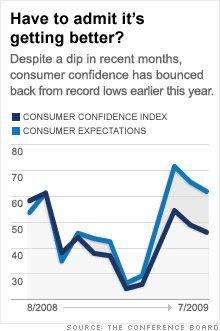The consumer confidence fake out
Consumer confidence fell in July, but is up sharply from record lows earlier this year. Still, until consumers start spending, it doesn't matter how people feel.


NEW YORK (CNNMoney.com) -- Consumer confidence took a dip in July and stocks fell on the news Tuesday.
The latest figures from the Conference Board overshadowed the fact that home prices rose on a monthly basis for the first time in three years. But while measures of consumer sentiment are important, I think they may get too much attention.
For one, confidence is not something that anybody trying to gauge what's going on with the economy can rely on as a predictive tool. Confidence is clearly a function of people reacting to news.
Dan Houston, president of retirement and investor services at the Principal Financial Group in Des Moines, Iowa, said the lower level of confidence in July should not come as a big surprise. That's because there has been a lot of talk in the past month about how unemployment is still rising and expected to increase further well into next year.
By the same token, it shouldn't be a huge shock that consumer confidence took a lemming-like fall off a cliff after Lehman's implosion last September and has since recovered from record lows set earlier this winter -- a time when stocks were at their nadir and people were worried about nationalizing banks and massive layoffs.
So instead of focusing on how consumers feel, people really need to pay more attention to what consumers do.
Touchy-feely emotions won't save or sink the economy. It all boils down to whether people are doing their best Rod Tidwell impersonation. Unfortunately, they aren't showing retailers the money.
Consumers have been reluctant to pull out their wallets. According to figures from the government, consumer spending was flat in April and up just 0.3% in May -- despite the fact that personal income rose 0.7% and 1.4% respectively during those months.
At the same time, people are squirreling away cash. The personal savings rate rose to 6.9% in May, its highest level in 15 years.
Talk back: What would you rather see: slow growth in the short-term and a more stable economy for the long-term, or a quick return to strong growth even if it raises chances of another recession years from now? Leave your comments at the bottom of this story.
The June numbers come out next week. But it's doubtful that there was a big surge in spending. Prominent retailers such as Target (TGT, Fortune 500), Costco (COST, Fortune 500), Macy's (M, Fortune 500) and JC Penney (JCP, Fortune 500) all reported same-store sales declines of at least 6% last month. And companies in a variety of sectors have been reporting sluggish sales for the second quarter.
"Behavior is where the rubber meets the road. What people are doing is a better indicator of where the economy is as a whole and a good leading indicator of what's to come," said Aaron Reid, chief behavioral scientist at Sentient Decision Science, a research and consulting firm in Portsmouth, N.H.
Reid's firm conducts a financial behaviors index for First Command Financial Services, a Fort Worth, TX.-based financial planner. And according to the most recent survey, Reid said he is not expecting a big uptick in spending anytime soon.
He pointed out that consumers are still divided as to what's happening with the economy, with 33% of those polled in his firm's survey saying the economy has hit bottom and 39% saying they think the recession will get worse.
"There is a great deal of uncertainty for the consumer. And when people are uncertain, they buckle down. Without clear guidance about where the economy is headed, that will continue," Reid said.
The fact that banks have clamped down on lending also is likely to keep consumers from spending as much as they might otherwise have done. That's one more reason why even if consumers regain their confidence, they may not necessarily show it by flocking to the malls.
"We think the economy is on the path to recovery, but it will be muted, a slow grinding type of recovery," said Wasif Latif, a vice president of equity investments with USAA Investment Management in San Antonio. "Things will eventually get better but a lot of consumer spending has been predicated on a strong credit environment."
Still, this shouldn't be considered a bad thing. In fact, if more consumers behave responsibly and stop spending more than they earn, then that decreases the chances of having another nasty credit-induced recession like this one down the road.
"I don't think we are going to see consumer purchasing habits resort back to the 'good old days' any time soon," Houston said. "This recession is going to leave an indelible mark on this generation. People realize they have to do a better job of managing their expenses."
And even though more saving and less spending could lead to a few years of subpar growth, I'd like to believe that most people would accept that it if it meant avoiding another gut-wrenching financial crisis
Talkback: What would you rather see: slow growth in the short-term and a more stable economy for the long-term, or a quick return to strong growth even if it raises chances of another recession years from now? ![]()

